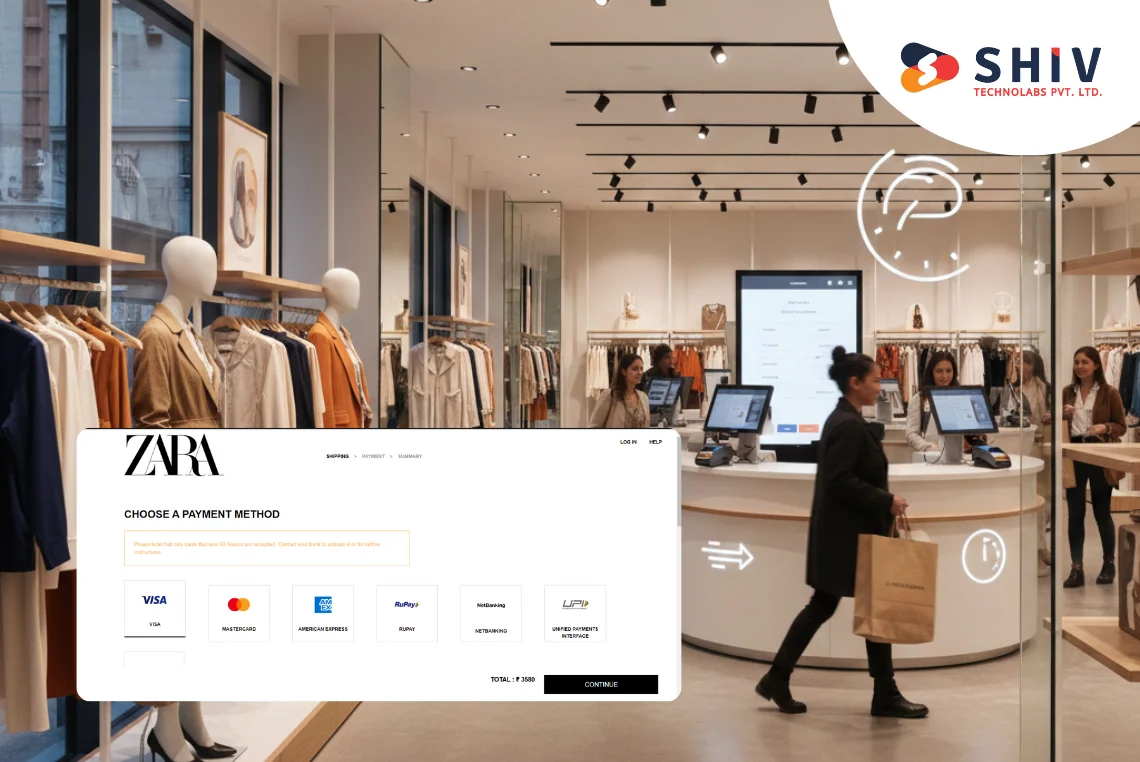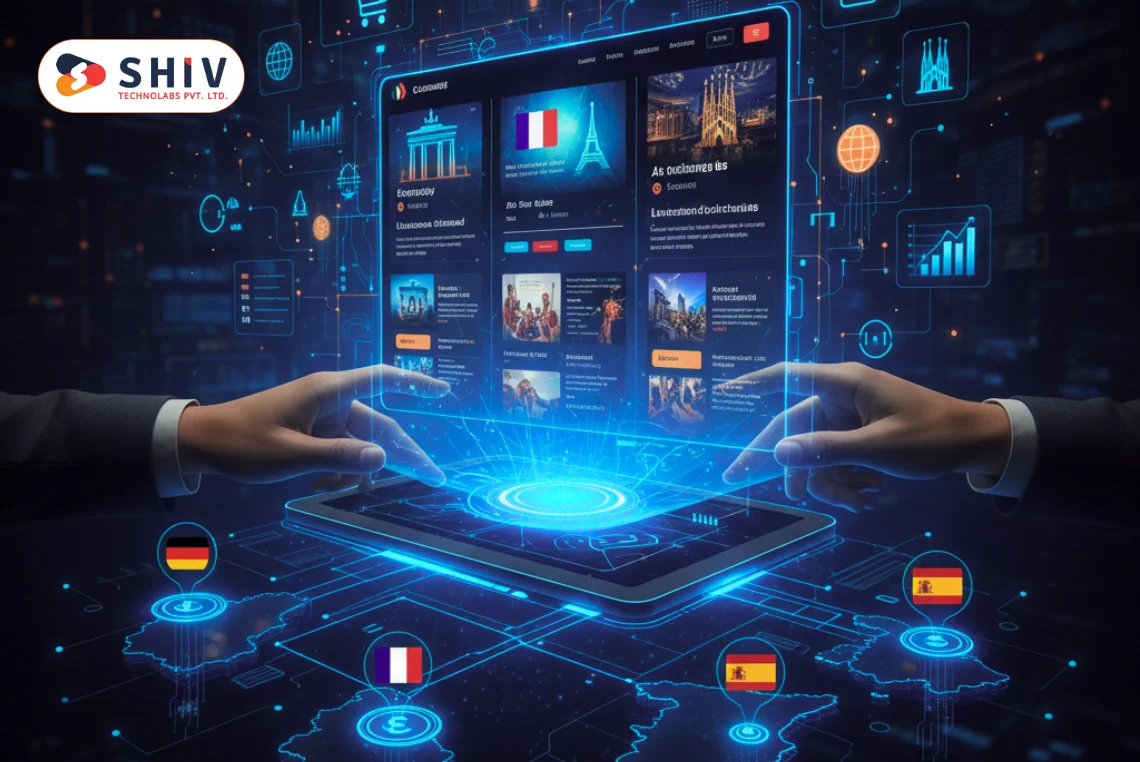Table of Contents
Establishing an eCommerce store takes more than just opening its website; one of the first and most essential decisions you must make is selecting an effective technology stack. With millions of online stores competing for attention, selecting an effective technology stack could give your store an edge; 4 out of every 5 shoppers abandon sites that load too slowly while almost 40% will leave due to security concerns.
How can you select the appropriate tools to power your business? Your tech stack – which refers to the combination of software technologies used to develop and run your store–has an enormous effect on everything from performance to customer experience and long-term scalability. This guide will show you how to select an ideal stack that ensures fast, secure, and scalable growth for your eCommerce store. Ready to make your tech work for you? Let’s dive in!
Identify the Key Requirements of Your eCommerce Store

The first step to creating your eCommerce store: identify its requirements. Every business is different and should tailor its technology stack according to goals, size, and customer base considerations.
# Assess Your Business Size and Complexity
Are You Starting or Expanding a Small Business? The complexity of your store will determine whether you need a simple, off-the-shelf solution or a fully customized system. For example, Platforms like Shopify or WooCommerce might be sufficient if selling a few products, but for larger inventories with features like subscription models or multi-currency support, you may require something more robust.
# Identify the Key Features Your Store Needs
Every eCommerce store is different; some prioritize an easy checkout experience while others require advanced search capabilities and personalized product recommendations. Identifying the features essential to your business helps you choose a stack that supports these features from the start. Whether it’s product management, customer experience, or security, ensure your stack is flexible enough to grow with your business.
# Consider Your Target Market
Your target market should guide your technology selections. For instance, targeting younger audiences requires prioritizing mobile optimization; similarly expanding internationally requires supporting multiple languages and currencies. Finding the ideal technology stack will enable you to meet audience needs while positioning your business for future expansion.
Essential Components of eCommerce Technology Stack

To build an eCommerce store that succeeds, the technology stack must contain components tailored specifically for their function in development. Here is an outline of core elements you should keep in mind.
# Frontend Technologies: Enhance user experiences
Your eCommerce store’s frontend serves as the front door to your customers, interacting directly with them to deliver an intuitive, fast, and visually pleasing user experience. A seamless user interface ensures customers can effortlessly browse products, purchase them with ease, and return for more. Common frontend technologies include:
Popular frontend technologies include:
- React Native: Ideal for creating dynamic, high-performance user interfaces that work across platforms – particularly mobile-first stores.
- Angular: Great for large-scale applications that need robust tools and scalability.
- Vue.js: Stands out for its simplicity and adaptability – making it the go-to solution for projects of all kinds and sizes.
Each framework allows designers to craft responsive designs that seamlessly adapt to different devices, offering customers a consistent shopping experience whether on a desktop, tablet, or smartphone.
# Backend Solutions: Select the Appropriate Server-Side Language
Backend services perform all the essential behind-the-scenes functions for an e-commerce store, from managing inventory and customer data to processing orders and integrating with external systems. Selecting an effective backend technology will have a direct bearing on its performance, security, and scalability – common backend technologies include:
Common backend technologies to consider:
- Node.js: An ideal platform for real-time applications and high traffic websites, Node.js ensures that your store runs quickly and can handle concurrent users without slowdowns.
- Python: With its user-friendly and adaptable nature, Python makes an excellent choice for stores requiring customizations or integration of advanced features like machine learning or data analysis.
The key consideration when selecting a backend solution is scalability. You want a framework that can grow with your business, supporting higher traffic and more complex operations as your store expands.
# Databases: Compare SQL to NoSQL for Data Management
Your database holds vital information about products, orders, and customers – making your choice of database system crucial to its performance as your e-commerce store expands.
SQL vs. NoSQL:
- SQL Databases (e.g., MySQL, PostgreSQL): Ideal for structured data with clearly defined relationships that must be stored efficiently, these SQL-based solutions can make for the perfect choice in smaller or medium-sized stores that must manage products, customer information, and transactions efficiently.
- NoSQL Databases (e.g., MongoDB, Cassandra): Ideal for larger e-commerce businesses that deal with unstructured data, high transaction volumes, or require flexible, scalable data management solutions.
Consider your business’s future when selecting a database. NoSQL provides more freedom in terms of handling unstructured data without slowing down processing speeds; while SQL databases tend to work better at handling well-defined relationships.
# APIs & Integrations: Connect Your E-Commerce Store to the World
Modern eCommerce stores have to interact with many third-party tools and services, from payment processors and shipping providers to CRM systems and marketing platforms. APIs act as the bridges between these systems to streamline the operation while creating an excellent customer experience.
Key integrations to consider:
- Payment Gateways: Payment gateways such as PayPal, Stripe, or Square help to ensure safe online financial transactions by integrating their services.
- Shipping Providers: APIs for services like FedEx, UPS, or DHL allow your customers to track shipments and calculate shipping fees in real-time.
- CRM Systems: Customer Relationship Management Systems such as Salesforce may assist in the management of customer data, tracking interactions, and offering marketing messages tailored for clients.
An integrated tech stack enables automation, reduces manual work, and improves overall efficiency for you and your customers alike.
# DevOps Tools to Maximize Deployment and Scalability
DevOps tools, or Continuous Integration, Deployment, and Scaling tools for short are tools used to constantly integrate, deploy, and scale an eCommerce store. These technologies help create a smooth-running store even as it grows and evolves.
Popular DevOps tools include:
- Docker: An application containerization platform that ensures your store can run reliably across different environments (development, testing, production).
- Kubernetes: Kubernetes is an open-source, containerized application management tool that makes eCommerce store deployment, scaling, and management simpler in cloud environments.
DevOps tools provide some great advantages when it comes to the updates in a smooth manner, handling traffic without any service interruptions and maintaining high availability, as your eCommerce store expands.
Digital Commerce Solutions for Every Business Type
Different eCommerce businesses require specific technology solutions; here’s how you can select an effective stack based on your business type.
- For Small eCommerce Stores: Platforms such as Shopify, WooCommerce, or BigCommerce provide cost-effective and user-friendly eCommerce storefront solutions ideal for small businesses or startups. Not requiring extensive technical knowledge but still customizable through plug-ins and integrations – these platforms make the ideal platform choices.
- For Growing eCommerce Stores: As your store expands, it will require an eCommerce solution with greater customization options that are flexible yet customizable. Magento offers such features for mid-sized businesses while handling high product volumes and complex catalogs efficiently. Open-source platforms provide more control over customizations and integrations.
- For Enterprise-Level eCommerce Stores: Large eCommerce businesses may require custom solutions tailored specifically for them to achieve maximum flexibility and scalability, which Shiv Technolabs excels at creating. Our enterprise custom eCommerce solutions help these enterprises scale and thrive within the digital marketplace.
Partner with Shiv Technolabs for Your eCommerce Store Development
At Shiv Technolabs, we specialize in offering innovative digital commerce solutions tailored to meet the specific requirements of your business. Our eCommerce solutions ensure your store is visually appealing, robust, scalable, and set for future expansion. From custom eCommerce development to seamless integrations with third-party tools – our expert developers can bring your vision into reality.
Conclusion
Your technology stack selection will have a direct effect on the scalability, performance, and security of your eCommerce store. A scalable stack will ensure it grows alongside your business while fast, responsive sites improve user experience and boost conversion rates. Security is crucial, and selecting a secure tech stack protects customer data and builds trust.
Shiv Technolabs specializes in digital commerce solutions to support growth, performance, and security for eCommerce businesses. From robust backend infrastructure to optimized performance or advanced security features – whatever it may be – we have the expertise necessary to tailor a technology stack specifically to your business. Contact Shiv Technolabs and grow your eCommerce store with digital solutions.!




















